Ed Scarpo's Blog, page 33
May 25, 2015
Path to WITSEC Built on Omerta's Dead
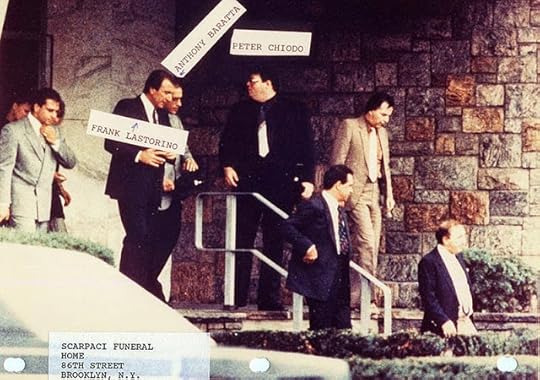 WITSEC was perfected by the time Fat Pete Chiodo was ready for it.
WITSEC was perfected by the time Fat Pete Chiodo was ready for it.Meet the Tweetfellas. Former mobsters living large, and in public.So read a recent newspaper article, that sought to take to task these "media characters" who have the gall to balk "after completing their government service as informants."
Instead of "vanishing into America’s heartland with new identities... they are sticking close — some would say dangerously close — to their stomping grounds and stoking high profiles on social media, personal websites and reality TV shows."
Former NYPD Police Commissioner [from 1996 to 2000] Howard Safir, who created the witness protection program when he was a top official of the U.S. Marshals Service, said they’re foolhardy if they think they’re getting a pass on the death sentence for violating the mob’s code of silence.
“Organized crime is very patient, even if it means it’s going to be years down the road for there to be retribution,” Safir warned.
The old school wiseguys must be spinning in their graves and mausoleums at the audacious behavior of these traitors hiding in plain sight.
We don't believe Marzulli deliberately intended to paint a bull's eye on some former mobsters' backs but that is exactly what he did.
Even worse, his facts are not consistent with truth (yes, we're feeling ironic today).
Howard Safir was a lot of things. He was the Assistant Director of the DEA in 1977, then Chief of Witness Security for the U.S. Marshals Service. In 1984, he was Associate Director for Operations for the U.S. Marshals Service, holding the position until his 1990 retirement from federal law enforcement.
Safir was indeed a lot of things but he was certainly not the man who "created" the Federal Witness Security Program.
He did play an important role, however, in transforming what was a ragtag group of low-level, under-compensated agents into a well-funded elite unit -- the Marshals that come to mind today was indeed the result of Safir's tweaks to the system.
But the architect of the program was Gerald Shur. As Attorney in Charge of the Intelligence and Special Services Unit of the Organized Crime and Racketeering Section of the United States Department of Justice he founded the program. Watch the video below. (He's described as "one of the founders" by C-SPAN.)
WITSEC was "formally" established under Title V of the Organized Crime Control Act of 1970, which defines how the United States Attorney General may provide for the relocation and protection of a witness or potential witness. Witnesses are put in the program at either the federal or state level.
The program falls under the purview of the U.S. Marshals Service, "the nation’s oldest and most versatile federal law enforcement agency" which has "served the country since 1789, often in unseen but critical ways," reveals the U.S. Marshal Service's website factsheet [PDF].
An excellent book that details the origin story is: Witsec: Inside the Federal Witness Protection Program (2003).
The Witness Security Program has successfully protected an estimated 18,400 participants from "intimidation and retribution" since the program began in 1971.
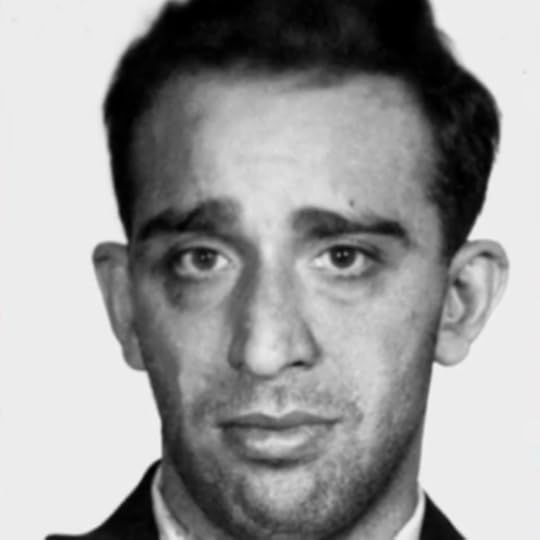 Persico was Shur's first target.
Persico was Shur's first target.According to Shur, about 95% of witnesses in the program are "what we call criminals". They may be intentional criminals, or people who are doing business with criminals, such as the engineer who bought off a mayor "because that's how you do business in the city. In his mind, he wasn't doing anything criminal", as Shur said.
The mob has not shown a proclivity to kill turncoats. We don't see this changing anytime soon.
But once upon a time it was a very different story.
As is widely known, shortly after JFK was elected president, his brother as Attorney General wanted to reinvigorate law enforcement's efforts to combat the Mafia.
Huge obstacles awaited them.
"The Mob had better sources than we did," Shut said in Witsec, which he cowrote. "Omerta was very, very real" at the time. Shur noted that law enforcement had proof of Omerta's strength in the form of a multitude of photographs of dead bodies.
Shur was one of 45 attorneys hired by Robert Kennedy to revitalize organized crime investigations.
At the time some 25 various federal agencies were working OC cases, and not one showed a proclivity to cooperate.
The worst offender on this front was J. Edgar Hoover and his FBI.
Kennedy was determined to end the infighting and put the focus on prosecuting organized crime figures.
He formed a special unit, of which Shur was part, named the OCRS (Organized Crime and Racketeering Section). Attorneys such as Shur were to investigate and prosecute crimes against 40 high-ranking Mafiosi whom Kennedy himself identified.
Shur held the view that getting high-level informants to give solid information was the best way to combat the Mafia bosses.
His first target was Carmine Persico -- Shur actually thought Persico might flip. At the time "The Snake," as the Gallo brothers began calling him for his duplicity in betraying them and attempting to garrot Larry Gallo, had been given a 15-year prison sentence. Shur believed Persico might flip to avoid the prison term.
Turns out Shur never got the opportunity. New York prosecutors refused to believe Persico would ever flip -- and the very thought was outrageous to them. They stopped Shur in his tracks.
"Do you guys know who Persico is?" shouted one prosecutor when he learned that Shur and his men wanted to offer The Snake a deal to inform on his cohorts.
"He's not some small-time hood! He's a boss, for God's sake! What's wrong with you guys!"
(Note: This blogger has heard from two different sources that Carmine Persico was indeed an informant. If this is true, then who knows what would've happened if Shur had been able to sit down with Persico.)
 Magliocco was related by blood or by marriage to the bosses of the Bonanno,
Magliocco was related by blood or by marriage to the bosses of the Bonanno, Magaddino and Profaci crime families.
OCRS was focusing on bosses (40, as noted) but Shur quickly realized they needed to lower their aim.
At the time Joseph Magliocco, in an attempt to consolidate his position as boss, was making a lot of noise on the street, meaning gunfire. He wanted the street littered with bodies, especially those of the Gallo brothers, before the Commission took over what was left of the tattered, troubled Profaci borgata.
Magliocco, like other bosses, ultimately proved to be too well insulated, even though his hold over what became the Colombo crime family was never more than tenuous.
Christopher "Christy Tick" Furnari, then a low-level Luchese mobster, happened to get jammed up when he was caught meeting with a Magliocco lieutenant while on parole.
Inside Furnari's home while arresting him for violating parole, Shur attempted to flip the loyal soldier, who's response was, basically, "stick it up your ass and fuck yourself."
"The fear of being sent back to prison was simply not enough to make Furnari crack."
Furnari, filled with contempt for the federal agents rifling through his belongings, even found a colorful way to indirectly confirm Shur's suspicion that he'd been sought to hit the Gallo brothers, of whom photographs were found inside a bible.
During Shur's interrogation about the photos, Christy Tick said with sarcasm:
"I sell life insurance and my boss gave them pictures to me. He told me to avoid selling life insurance policies to those guys. They might not be living too much longer."
Shur was suddenly horrified.
He realized the photographs of the Gallo brothers had been taken by the NYPD during surveillance.
Magliocco was getting information from Shur's own people.
At the time, in fact, so many cops and judges were on the mob's payroll it was impossible even to bust a bookie's wire room. The law would track down a location and before they could belt the front door, the occupants had vanished.
The first-ever mobster to flip, testify and get witness protection was Paddy Calabrese.
The program's earliest incarnation left much to be desired.
Part two coming soon...

Published on May 25, 2015 10:38
May 18, 2015
Goodfellas 4 God Ministries' Sizzle Reel for Reality Show
We present a sizzle reel for an intended television series regarding Goodfellas 4 God Ministries. The show focuses on the real-life stories of those who departed "the life" to rededicate themselves to Christianity.
A trilogy of feature films based on members' true live stories is also planned.
The above was produced by Steve Tatone at Midnight Pass Entertainment.
Below is the trailer from Midnight's latest film, called Blind Pass, which stars Armand Assante.

Published on May 18, 2015 15:00
May 15, 2015
One of NYC's Last Gangland Hits Allegedly Solved
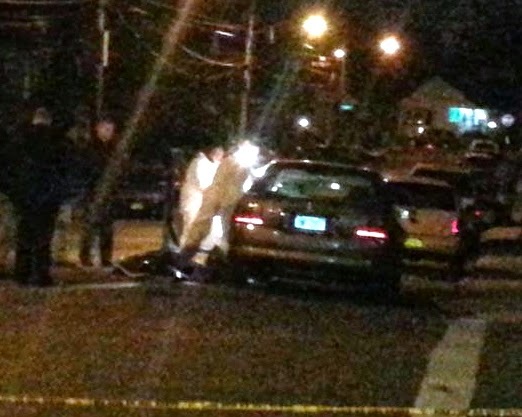 The murder scene of Michael Meldish.
The murder scene of Michael Meldish.In November 2013, one of the last mob hits in the New York area took place.
And now law enforcement reportedly has arrested those responsible, including a soldier in the Bonanno crime family.
Gangster Michael Meldish was slain the old-school way, with a bullet to the back of his head. The killing had all the signs of a gangland hit, complete with the victim slumped over in the driver's seat of his rusty Lincoln LS in Throgs Neck on Ellsworth Ave.
Meldish, whose brother is serving 25 to life in prison, was a notorious mob shooter who law enforcement believes killed more than 10 people in a decades-long criminal career during which he helmed the notorious Purple Gang of New York.
“Michael was a stone-cold killer,” Joseph Coffey, former commanding officer of the NYPD’s organized crime homicide task force, told the press at the time of the slaying.
"Detectives and FBI agents quietly arrested one — and possibly two — more suspects this week in the 2013 execution slaying," Gang Land News reported this week.
"Authorities now have several of the alleged killers of Michael Meldish, who was 62 years old when he was slain, on ice while prosecutors push to obtain an indictment against them for the murder. Law enforcement sources identified the definite new suspect in the slaying as mob associate Christopher Londonio.
"Londonio, 41, and his reputed mob superior, Bonanno soldier Pasquale (Patty Boy) Maiorino were arrested on federal gun charges Monday and ordered held without bail. The arrests follow a joint investigation by the NYPD, the FBI, and the offices of the Manhattan U.S. Attorney and the Bronx District Attorney. The federal charges stem from a state gun possession rap, filed against the defendants in November. The two men had been free on bail.
"Sources say Bronx prosecutors will soon ask a grand jury to indict Londonio and a hoodlum named Terrence Caldwell for the gangland style rubout. Meldish's body was discovered on November 15, 2013 in a classic mob hit victim pose: He was seated behind the wheel of his car parked in front of his home at the corner of Ellsworth Avenue and Baisley Avenue in the Throgs Neck section of The Bronx. He had suffered a single fatal bullet wound to the head."
"Caldwell, 57, is accused of being the trigger man in the hit, according to an arrest complaint by NYPD detective Darrell Julien. Caldwell, who has a drug conviction on his rap sheet, was remanded without bail following his arrest, said Bronx DA spokesman James Brunner."
In 2011, Meldish's younger brother Joseph, was tried for a 2007 murder during which he shot a man nine times. Both Meldish brothers belonged to the Purple Gang.
The gang was known for killing and dismembering rivals as it controlled the heroin trade in Harlem and the Bronx in the 1970s and 1980s. Its members — many of whom were relatives of more established crime figures — often freelanced as “muscle” for the Lucchese, Genovese and Bonanno families.
Taking its name from a group of thugs that terrorized Detroit during Prohibition, the Purple Gang grew so powerful in the late 1970s that authorities feared it might attempt to become the area’s sixth organized crime family — potentially igniting an all-out mob war.
The group murdered some 17, including at least two police informants, and dismembered many victims. They also were behind the "large-scale distribution of narcotics in the South Bronx and Harlem" as well as selling guns, allegedly to groups based outside the U.S.
Interestingly, the group is said to have had 30 "made" members," according to police reports and some 80 "associates," according to the DEA.
According to one law enforcement group, the Purple Gang supplied the drug network of black drug dealer Leroy "Nicky" Barnes with heroin at $75,000 per kilo.
The DEA, FBI and NYPD monitored the group closely in the 1970s.
A 1976 federal report cited the gang’s “enormous capacity for violence” and “lack of respect for other members of organized crime.”
The crew’s power waned in the late 1980s as members were ensnared in drug busts.
Numerous ranking Mafia members once belonged to the crew, including Bonanno boss Michael "Mikey Nose" Mancuso and Genovese capo Daniel "The Lion" Leo.

Published on May 15, 2015 14:38
May 10, 2015
60 Minutes Glimpses Part of Scores Stripclub Story
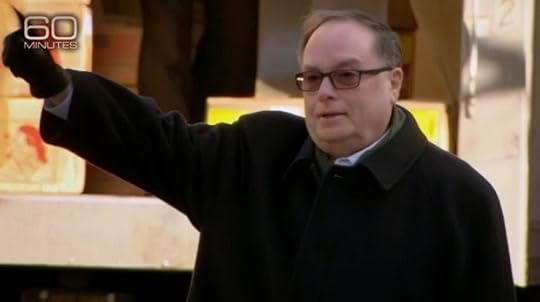 Michael Blutrich, once partners with New York Governor Andrew M. Cuomo, will be featured on 60 Minutes
Michael Blutrich, once partners with New York Governor Andrew M. Cuomo, will be featured on 60 Minutestonight. The news show will revisit the Scores case.
REVISED BASED ON VIEWING OF 60 MINUTES:
Michael Blutrich grew up in Brooklyn, New York. After graduating from Georgetown in 1974, he opened his own firm on Park Avenue, Blutrich, Falcone & Miller. The current Governor of New York, Andrew M. Cuomo, was a partner in the firm (1985-1988).
In the 1990s, using stolen money, Blutrich started investing in restaurants and nightclubs including the strip club Scores. At some point he started working in cahoots with Steve Sergio, described by 60 Minutes as a Gambino associate. Sergio revealed the extent of the scams he generated, which included taking payment from employees within the club, as well as club suppliers. Sergio even appointed a busboy as Score's accountant. "He was incompetent, Sergio told Anderson Cooper.
We were relieved that Stephen Sergio was only "slightly agitated" with us after we contacted him for our recent Scores story. Steve is a tall, burly guy. After being indicted for embezzlement, Blutrich agreed to work undercover for the FBI who really, really wanted to nail some Gambinos, John "Junior" Gotti specifically.
Blutrich recorded about 1,000 hours of conversations with mobsters.
Anderson Cooper recently sat down with Blutrich for a 60 Minutes segment that aired on Sunday, May 10, at 8pm on CBS.
.
Blutrich and Lyle K. Pfeffer were indicted for both Heritage Foundation scam and Scores before becoming informants in the Scores case. In the end they helped put away 60 people, according to reports.
Federal agents credited the two with risking their lives to infiltrate the Gambino crime family, which supposedly put a $1 million bounty on each head. We wonder if the FBI asks their snitches to say this stuff about bounties on heads.
"From the standpoint of law enforcement, we simply could not have prosecuted these insidious criminal cases without the help of these defendants," said Assistant U.S. Attorney Art Leach. "These men cooperated against the most powerful crime boss -- that is John A. Gotti Jr. -- and he [was] in jail.''
Michael Blutrich and Lyle Pfeffer, who were imprisoned for stealing millions from an Orlando insurance company, hoped their actions in New York would lead to a reduction in their sentences.
 But a federal judge in Orlando was unmoved.
But a federal judge in Orlando was unmoved.She refused a request by the government and defense to cut the men's sentences dramatically as a reward for their efforts against organized crime."Their cooperation was extraordinary, but the crimes in this case were extraordinary," said U.S. District Judge Anne Conway. "The two have to be considered together."
The men originally were sentenced to 25 years for their crimes against the National Heritage Life Insurance Co. They had hoped for new sentences of six years. But what they received equaled a typical reduction for defendants who cooperate with the government: Each got 16 years and eight months. They served about 13, got out two years ago, and apparently are in danger of Mafia retaliation though we believe the current Sicilian-led Gambino family couldn't care less about murdering Blutricht and throwing unnecessary heat on a well hidden operation.
At the sentencing in Flordida, the Orlando Sentinel reported:
After a moment of shocked silence, the top-floor courtroom erupted when Conway announced her decision.
Defense attorneys cried out in disbelief.
Debbie Pfeffer, Lyle's wife, left the room wailing, cursing and pounding on the walls. "This judge has taken my family from me," she cried. "And John Gotti Jr. will come for me when he's released from prison and put a bullet in my head."
Blutrich and Pfeffer served more time than John "Junior" Gotti Jr., whom the two men helped send to prison.
Blutrich, 51, a New York attorney, and Pfeffer, 41, a Manhattan businessman, pleaded guilty to racketeering, fraud and money-laundering charges in the National Heritage Life case. Nearly half of the 25,000 policyholder victims live in Florida.
Blutrich and Pfeffer were responsible for $237 million of a $400 million theft, the largest insurance loss in U.S. history. Only about half of the $400 million has been recovered.
They lived the high life for years with stolen insurance money. After their arrests, they agreed to cooperate.
In addition, the men used $300,000 of money from the Orlando insurance company to buy Scores, a Manhattan strip club that became a hangout for movie stars and athletes.
Court records show that "Junior" Gotti became interested and tried to take the business from Blutrich and Pfeffer. The men agreed to pay Gotti $100,000 to keep the club.
Gotti, then the 37-year old son of infamous underworld boss John Gotti Sr., pleaded guilty to racketeering and other charges. In exchange, the Scores' extortion charges were dropped. He served six years.
In federal court in Atlanta, Steve Kaplan, owner of the Gold Club topless club, Michael DiLeonardo and others were on trial in connection with the shakedowns at Scores. Mikie Scars was acquitted.
Leach was one of many prosecutors, federal agents and defense attorneys from New York, Georgia and Florida who made impassioned speeches to Conway to reduce Blutrich's and Pfeffer's sentences.
Assistant U.S. Attorney Judy Hunt, the lead prosecutor in the insurance case, agreed with the large reduction.
Both men were in protective custody in prison and were sent into the Witness Protection Program upon release.
"We've done everything we can do as human beings and everything we have been asked to make up for it,'' Blutrich said. "It has been staggering.''
The NY Times reported that Michael Blutrich became entangled in the insurance fraud in 1990 when he was hired by three Florida businessmen seeking control of the National Heritage Insurance Company in Orlando, whose main business was selling annuities. Blutrich would later admit that he helped the businessmen take over National Heritage by setting up a phony bank account and providing them with a fake check for $4 million when their assets barely totaled $1 million.
Prosecutors said the three Florida men gained control of the company's assets as soon as they turned over the check, then dipped into the company's own funds to cover the check before it bounced.
Blutrich soon began reaping dividends from National Heritage. His clients, now the company's top officials, lent him $300,000 as seed money to open Scores. One of them, David L. Davies, became chief executive of National Heritage and invested $700,000 of his own money as the secret but principal partner of Scores, Mr. Blutrich said.
He was told that John J. Gotti was demanding payoffs from anyone opening a nightclub at the site Blutrich had picked.
He was told ''certain accommodations would have to be made; otherwise they were ready to go with a bomb.''
Asked why he did not abandon Scores at that point, Mr. Blutrich said: ''I wanted to open and run a sophisticated, upscale club. If I did not accede to their demands, there would not have been a Scores.''
Scores, which featured topless dancers and big-screen television sets tuned to sports, opened on Oct. 31, 1991, at 333 East 60th Street. About this time, Mr. Blutrich and Mr. Pfeffer met and their business worlds began to merge.
Pfeffer opened a string of carwashes while in college. Later, he advanced into pooling investments for real estate deals and supervising mortgage portfolios for investment companies.
In 1992, through Blutrich's introductions, National Heritage gave hefty commissions to Pfeffer for managing the company's real estate investments and for finding buyers for its holdings.
For the first year, Blutrich said, Scores was hemorrhaging red ink, and by late 1992 Mr. Davies of National Heritage wanted out. Blutrich's solution was to bring in Pfeffer as the chief investor and to manage the club's finances.
Pfeffer relished the idea of overseeing a popular nightclub that attracted show business and sports figures. He took over as executive manager, with Mr. Blutrich remaining as his main partner and the club's lawyer.
According to the Scores case indictment, from 1991 to 1997, Gambino family members extorted more than $1 million from the owners and employees. (Note all those "Mafia goods" caught on stark surveillance videotape were caught in the operation's final year.)
''Some of them were scary,'' Pfeffer said of the Gambino family members who frequently went to the club. ''They talked about blowing away people with shotguns and told us, with smiles on their faces, how easy it would be for them to kill us.''
The mobsters rarely paid for meals and drinks. They would also pick up cash left on tables by customers and tell waiters, '' 'It's on the house; they're friends of ours,' '' Pfeffer recalled. When he objected to the mobsters' actions he was threatened. After one such incident, he walked into his apartment and found a bullet on his coffee table.
The first sign of legal trouble for Mr. Blutrich and Mr. Pfeffer came in 1994, when insurance regulators closed National Heritage after uncovering a maze of embezzlements, worthless investments, assets inflated to conceal losses and suspected kickbacks to company officials for authorizing secret loans.
In 1996 and 1997, a Federal grand jury in Florida indicted Mr. Blutrich, Mr. Pfeffer, Mr. Davies and 13 others on fraud and conspiracy charges that led to a loss of about $400 million for the company, which went out of business in 1996.
Mr. Davies was never been implicated in the Scores case.
In November 1996, four months after Mr. Blutrich and Mr. Pfeffer were indicted in Florida, Federal and state investigators raided Scores as part of a separate investigation of Gambino family rackets in the New York area. They also raided the Scores offices that Mr. Blutrich and Mr. Pfeffer had shared at 3 Park Avenue.
Both men soon agreed to work undercover for the authorities. They did so after learning that they had been ensnared in a broad investigation of the Gambino family. Moreover, substantial evidence had been obtained against both men through court-authorized video cameras and microphones that the FBI had planted in their offices.
A Year of Pretense And Ominous ThreatsOddly, the Florida indictments helped the two men in their undercover roles. ''It gave us more credibility,'' Mr. Pfeffer explained. ''The mob guys thought that nobody who gets indicted is cooperating, and they offered to help us raise bail and find lawyers.''
But there were tense moments. At meetings concerning Scores payoffs and the investigation, Mr. Blutrich and Mr. Pfeffer said, the mobsters often put guns on the table or ostentatiously displayed their weapons.
''They told us not to worry about the guns,'' Mr. Pfeffer recalled. ''They said, 'It's only for rats.' ''
As part of the cooperation agreement, the FBI installed concealed video cameras and microphones in Mr. Pfeffer's Park Avenue office. Outside the office, both men had recording devices under their clothes, in their cars and in cellular telephones.
Some mobsters, Mr. Blutrich and Mr. Pfeffer said, would playfully pat them or unbutton their shirts before beginning conversations.
''It was a year of unbearable tension,'' said Mr. Blutrich. ''They came pretty close a couple of times to finding the wires on me.''
Mr. Blutrich, who is divorced, and Mr. Pfeffer, who is married and has daughter from a previous marriage, said they expected to receive lighter sentences in return for cooperating, but were given no assurances by prosecutors.
In prison, like other witnesses in Mafia cases, they were confined in segregated cellblocks out of concern for their safety.
''We didn't start out as criminals, but we were fast-track guys who were out to make lots of money,'' Mr. Pfeffer said. ''By working undercover we tried to make up for the wrong things we had done, but as a consequence we'll be looking over our shoulders for the rest of our lives.
''I don't think,'' he added, ''there will be happy endings for us.''
We repeat this is only part of the Scores story. We left out some published information that is untrue, according to several of our sources. We have also left out facets of the story we believe are true which have not been confirmed or corroborated yet.

Published on May 10, 2015 08:09
May 9, 2015
Skinny Joey: Feds "Wanted to Stick It Up My Ass"
 They tried to stick it up Merlino's ass, he said.....
They tried to stick it up Merlino's ass, he said.....From Big Trial: "They owe me four months," Joseph "Skinny Joey" Merlino quipped during a phone interview this afternoon, adding, "I hope they just leave me alone. I'm not doing anything wrong."
Last month, when the appellate court announced it was vacating the lower court order that sent Merlino back to jail, his lawyer, Edwin Jacobs Jr. declared that "my client has served a four-month sentence for doing absolutely nothing wrong."
But that's not exactly the legal takeaway from the split decision of the appellate court that was made public today.
Merlino is back in Boca Raton where he is the front man for a posh Italian restaurant called Merlino's.
The appellate court never took up the broader defense argument that there was not sufficient evidence to support the allegation that Merlino had knowingly consorted with fellow South Philadelphia mobster John Ciancaglini in a Boca Raton cigar bar while on supervised release.
Instead, in a split 2-to-1 decision, the appellate judges found that Merlino had not been served a summons prior to the expiration of his three-year probation period and as a result, the U.S. District Court in Philadelphia no longer had jurisdiction.
Timing is everything. And in this case, the feds dropped the ball.
The irony is that they had plenty of time to meet the deadline, but opted instead to wait until the last minute to cite Merlino, a strategy that has been employed in other cases in the past and one that defense attorneys and defendants deem petty and personal.
"They wanted to stick it up my ass," Merlino said of the decision to file a probation violation charge literally at the 11th hour.
Read the background and the rest of George Anastasia's story

Published on May 09, 2015 17:42
May 8, 2015
Who Really Ran Scores Shakedown?
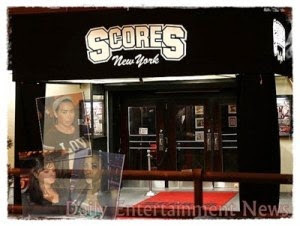
UPDATED, STEVE SERGIO CALLED
Greg DePalma was desperate to regain his standing as a capo when he was released from prison in February 2003 after serving a 70-month sentence for racketeering.
Everyone thought he was washed up.
He'd been caught talking on tape, which led to his conviction as well as that of John A. "Junior" Gotti in the Scores strip-club extortion case. (They copped plea deals, actually, at the last minute.)
Testimony in a 1999 case related to the Scores case told a violent tale of murders by Albanian gangsters, as well as the Gambino family shaking down the premium strip club.
On trial were brothers Simon and Victor Dedaj, reputed Albanian mobsters accused in the 1996 shootings of a bouncer and a waiter inside the Upper East Side strip club.
The New York Post described it as a case "with enough mobsters, loansharks and topless dancers to fill a Martin Scorcese flick."
In opening statements, Assistant District Attorney Dan McGillycuddy told jurors how an early morning argument over a mobster’s girlfriend escalated into deadly violence.
“Michael Greco was shot at point-blank range over his right eye,” McGillycuddy told jurors of the double-slaying’s first victim, a 26-year-old bouncer from The Bronx.
 Scores dancers....
Scores dancers....Simon then turned his 38-caliber pistol on the second victim, a 22-year-old aspiring actor named Jonathan Segal, a waiter at the club.
As Victor stabbed the waiter, Simon fired three times, striking at his neck and back.
“He shot him, he shot him, he shot him,” McGillycuddy shouted.
But he told jurors his case also highlighted accounts of strippers, mobsters and other crooks.
Willie Marshall, the correction officer who served as the club’s bouncer (and was "Junior" Gotti's weightlifting buddy), told the feds he ferried $100,000 in “tribute” to the young Gambino family acting boss.
Other witnesses included two strippers.
What the hell happened inside Scores? Since Junior copped to a plea deal, there was never a trial. You never really heard about it.
We have heard bits and pieces of different things. Perhaps owing to our interest in strippers, we held on to this one, asking various sources the odd question here and there. We think we have some of it figured out. Or at least we know on whose door to knock for the comprehensive lowdown. We wish it were a stripper instead of a mob guy.....
Junior and the $100,000 payoff, which we covered in two separate stories, as well as the Albanians killing two people (we don't believe the true motive behind those shootings has ever been revealed and based on what we've heard, it wasn't over any woman as the feds argued) are really the only key points -- in addition to the involvement of the DePalmas.
The guy truly behind the years-long Scores shakedown is someone you probably never heard of. And it wasn't former underboss Frank LoCascio's son, Salvatore, as some may think.
It is interesting the Post mentioned Martin Scorsese... keep reading.
What we think you know about the Mafia's shakedown of Scores would fill a thimble compared to the complete story. Film producers remaking Mafia-based films from the year before should put their ear to the street, as we have down. There is a lot that you don't know.....
We have heard 60 Minutes will highlight the Scores case either this Sunday or the following -- we have a pretty good idea who will be showcased....

One of two men, who may appear on the hit news show, were set to testify against Junior and others named in that Christmas tree indictment. The two were the true informants who, snagged in a fraud case in Florida, decided to give the feds the Gambino family on a platter to get out of jail. Only the joke was on them, it'd seem.
One is serving decades, the other served the longest prison term ever for a cooperator, we've heard. Goes to show, don't commit crimes in biblical Florida where judges follow the model set be Jehova, God of the Old Testament.
Michael D. Blutrich and Lyle K. Pfeffer were riding high in the 1990s. Blutrich had founded a politically connected Park Avenue law firm, and Pfeffer was a venture capitalist. Each earned more than $500,000 a year, probably a lot more.
Greed made them part of two major conspiracies. One involved stealing millions from a Florida-based insurance company. The other involved the Gambino family joining Scores as secret partners.
For six years the two men -- a politically connected blueblood lawyer and a VC --claimed they lived in Mafia fear, though this didn't stop them from playing along.
''I knew what I was doing were crimes,'' Blutrich told one newspaper after the jig was up. ''I thought I was giving up a finger. I didn't realize I was giving up an arm.''
In 1996, the two flipped once Federal and state authorities implicated them in the Florida insurance fraud and the New York Scores case.
Seeking reduced prison sentences, they worked undercover for a year, taping more than 100 conversations that prosecutors say contributed to indictments of several members of the Gambino family on charges of extorting more than $1 million from Scores.
Blutrich and Pfeffer were to set to act as the key witnesses in the Scores trial against Junior Gotti and five co-defendants in Federal District Court in White Plains.
''This is the first significant organized-crime case in which two people who were not 'made' members -- soldiers -- or associates of a crime family obtained such a volume of graphic evidence working undercover,'' Myles H. Malman, a former Federal prosecutor in Florida who served as Pfeffer's lawyer told a reporter.
You see the contradiction? The shakedown of Scores ran for six years. Junior Gotti only got one payoff of $100,000. And that $1 million figure we believe is awesomely low....
The truth is what really happened in Scores has never been told before.
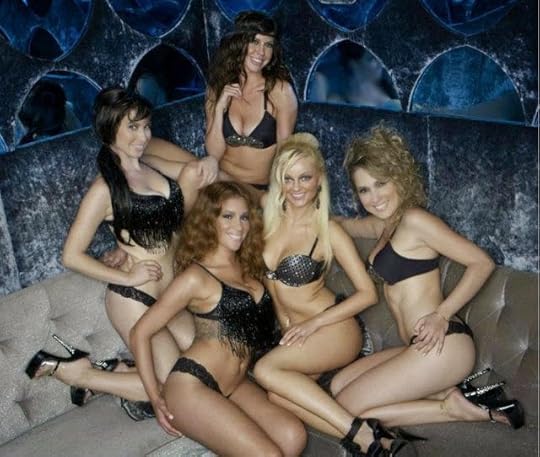
We know some of it. Sources tell us one guy was in there from the start, who, like an entrepreneur, created a multitude of scams -- involving the coat check, the strippers, anything and everything you can think of.
His name is Steve Sergio.
We called Steve for the inside dope (we procured his phone number from another source).
Steve wasn't pissed that we called him out of the blue, but he clearly didn't want to talk to us. He rushed us off the phone, in fact. We tantalized him with: "We heard the Scores story would make a good Martin Scorsese flick," quoting the Post article above....
The quicker he hung up, the more story he has to tell, we figure.
Also there were a few things Sergio told us that we jotted down before he terminated the connection.
He acknowledged we were right about him being the one and only point man. He said, "I had no partners. Tore Locasio had nothing to do with Scores."
Before he hung up, almost as an afterthought, he tossed out with a laugh: "I'll tell Scorsese what happened. Outside of that have a nice day."
ITEM: Steve Sergio called us this morning, slightly agitated but still not truly angry. We are glad. He highlighted the fact that he "had no partners," by informing us: "I was not part of their mob."
Stay tuned.... And if there are any strippers out there who know anything about this, give us a call.

Published on May 08, 2015 15:38
May 7, 2015
Michael DiLeonardo On the Gotti Reign
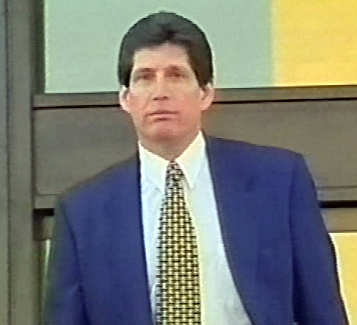 "Mikie Scars" walks out of Georgia courtroom.
"Mikie Scars" walks out of Georgia courtroom.After reading Michael "Mikie Scars" DiLeonardo's testimony and watching him on the Trevor McDonald show, we wanted to know more about his story. We reached out and initially asked for his opinion about the ongoing media feud between John Alite and John A. "Junior" Gotti (the illustrious GangLand News even wrote about it in Tweets Not Bullets: Mob War in CyberSpace).
We got what we sought from "Scars" -- that and a whole lot more. DiLeonardo knows Cosa Nostra, and we spent most of this week working with him. We thank Michael for generously spending his time with us. He is a gracious, considerate man.
And in a move that both surprised and honored us, Michael asked to include a personal note at the end in which he extends an olive branch to his former best friend and boss, and makes an offer we think John Junior shouldn't refuse.
Michael DiLeonardo's story certainly warrants a full-length book. When we asked Michael if he was working on getting his life story onto the page, he told us only that he's received many requests.
"Mikie Scars" beat the Feds when he was tried in Georgia for extorting some $70 million from Georgia's Gold Club and $100,000 from the Manhattan-based high-end Scores strip club.
The trial ran from mid March to August 30, 2001, when DiLeonardo was acquitted.
John Gotti Senior died around 10 months later, on June 10, 2002. "Mikie Scars" was filmed by the Feds attending the Dapper Don's wake.
Days after Gotti's burial, Michael and others were arrested based on Craig DePalma's sealed Grand Jury testimony.
"Fat Dom" Borghese, Anthony Rotondo, Anthony Capo and "Vinny Ocean" Palermo were set to testify against Michael for his role in the Fred Weiss murder.
While sitting in jail, DiLeonardo learned that Joseph "Jo Jo" Corozzo, consiglieri, speaking for Peter Gotti and Nicholas "Little Nicky" Corozzo, had "stopped all my income, all my money, mob and non mob-related," Michael said.
"Now this is not an excuse for flipping. There are no excuses for flipping if you are in the life."
(The irony here is that John Gotti Senior sent a message through Peter Gotti to offer DiLeonardo the consiglieri position circa late-1998-1999. “I turned him down,” Michael said, allowing Jo Jo the opportunity.)
DiLeonardo had nothing coming to him, he was informed. Angered, Michael sent a message back to the administration:
"I don't remember dying or getting life yet. I may come home one day."
Soon after, an associate named Noel Modica sent a message to Michael through Madalina that he'd been shelved.
"She had no clue what it meant," Michael said. "I couldn't believe what she had said.
"Now this is not an excuse for flipping. There are no excuses for flipping if you are in the life.
"So it crushed me. Broke my heart. In that state of mind I made the choice to flip. It obviously was not a good time to make a huge, life-changing decision, but I did, to my chagrin."
Ironically, DiLeonardo got his big break in the Mafia when another man flipped, Salvatore "Sammy the Bull" Gravano.
"After Gravano and others went away, there was a power vacuum in the Gambino crime family. Senior and Junior put me in charge of construction. I was in position to earn a lot of money," said DiLeonardo.
Born into the Mafia
DiLeonardo was born and raised in Bath Beach, Brooklyn.
"I came up in that life under Jerry D’Aquila, whose father [Salvatore "Toto" D'Aquila] was the first boss of bosses. Paul Zaccaria [whose father was a brother-in-law to "Toto" D'Aquila] also schooled me."
The D'Aquila name is prominent in early American Mafia history.
Salvatore "Toto" D'Aquila (November 1877 – October 10, 1928) was the first boss of what, in 1957, became the Gambino crime family. In 1910, Giuseppe "the Clutch Hand" Morello, known as the first "boss of bosses," was imprisoned. D'Aquila broke from the Morello crime family in which he'd been a captain and formed his own family.
DiLeonardo's grandfather, Vincenzo DiLeonardo, was a capo in D'Aquila's Brooklyn faction.
"We started going back and forth over things. He's not supposed to get pinched for Scores, I'm supposed to be pinched for Scores. I'm supposed to be pinched for Scores."
"My grandfather and great grandfather were sent here by Vito Cascioferro. They were paesans from Bisacquino, Sicily. My grandfather was a captain early on with D'Aquila. Jerry was a captain too but was taken down for misusing money.
"Paul Zaccaria drove Carlo Gambino around for a time.
"My father was Sal D'Aquila's godchild.
"I came up under both those guys. We called each other cousins. D'Aquila was in control of everyone in New York for a period, with some resistance. He had Cleveland, Buffalo and Pittsburgh come into him.
"D'Aquila was betrayed by Mineo. A war was happening for years leading up to his death and beyond until Mineo was killed and that made the peace," DiLeonardo said.
The Sicilians, back then, were based on Elizabeth Street, First Avenue and Harlem in New York City, DiLeonardo said.
Holiday Buttons on Christmas Eve 1988
Michael and John Junior were both made on Christmas Eve 1988. Sammy the Bull ran the ceremony.
Michael noticed that Junior underwent an instant change following their induction.
"It happens with a lot of guys," DiLeonardo said. "As soon as they get their finger pinched they wake up the next day and get hit with all this information and knowledge. The think: This is royalty. Most guys get dumber instead of smarter" after getting their button.
He admits the two men had good times together. John Senior had wanted DiLeonardo close to his son. "John Senior saw something in me that he thought would be good medicine for his son."
Real difficulties between the two didn't commence until years later, in 1996 and 1997, DiLeonardo said.
"We started going back and forth over things. He's not supposed to get pinched for Scores, I'm supposed to be pinched for Scores. I'm supposed to be pinched for Scores."
DiLeonardo said that greed, a major trait of Junior Gotti, was a major problem for the Gambino crime family. Long before the Scores indictments landed, "I told John we're going to jail for this because he involved Greg DePalma."
"What is he, a rat?" Junior asked Michael.
No, but Greg DePalma constantly said incriminating things on wiretaps. He was caught, put away and reclaimed what was his on the street several times owing to his words being caught on tape.
It was no secret that DePalma was a blabbermouth.
For all the trouble it caused him, Michael had nothing to show for his involvement in Scores. He was supposed to be paid $10,000 for his role. "The payment from Scores came from Craig to Junior at a wedding. Then Junior gives it to me, then takes it back saying it was for appeal lawyers for Tony Morrelli and Ozzie Santini, which was fine by me."
Junior liked to hang around with fellow weightlifters. Many injected a daily diet of steroids to bulk up. Muscles were common ground for Junior, Mikie Scars said. "Junior had Willie Marshall around him. Junior knew he was a corrections officer. I'd break his balls over this."
Michael explained: "His father was charismatic. When Junior put the suit on, he knew he wasn't his father. That's why he felt more comfortable in the baseball cap and the sweatsuit. His persona was his muscles. He looked in mirrors, walked down 101st Avenue getting his picture taken. That was his armor, his muscles.
"He didn't understand this is Cosa Nostra. You could be an old man and live off a lifetime of respect." Rather, his mentality was: "'I'm Gotti, I have muscles," DiLeonardo said. "He'd sit at the table in a restaurant and take a deep breath and flex his pecs, with just me sitting there."
Junior also gave Michael pause with the way he spoke of his father. "Junior referred to his father as a god," DiLeonardo said.
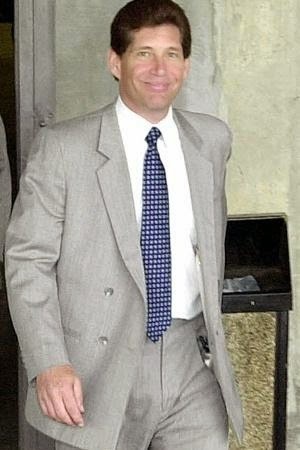 "He also called his father the "chief" during meetings with the administrations of other families.
"He also called his father the "chief" during meetings with the administrations of other families."I spoke to [Jackie] D'Amico and told him to also speak to Junior about calling John Senior chief to other families. Each family has its own chief, they don't wanna hear that."
On this point, Junior did take the advice, and stopped referring to Senior as the chief in front of other families.
DiLeonardo said that Junior was a "power" and that the belief that some crime families didn't recognize him is totally false.
"When we were in the street, we met many times with [the administration of the Genovese family]," as well as the administrations of other families.
"We did business with the West Side all the time."
DiLeonardo said that he had Junior's ear their first few years together on the street.
"Early on he was not greedy," DiLeonardo said.."After Senior went to prison, I was influential."
John Gotti Senior had wanted it that way. "Junior tells me 'my father wants me to be close to you.' I became acting captain and then capo."
Junior (and DiLeonardo) Banned Sanctioned Hits
Asked what Junior's largest contribution to the Gambino crime family was as its acting boss, DiLeonardo said that it was issuing a ban on sanctioned hits in the Gambino family.
"I'd been telling him that we had to stop the murders and the drug dealing. I also told him he had to let the family earn." Michael was referring to old timers especially, who wanted to generate revenue.
So Junior banned all sanctioned hits in the Gambino family, a proclamation that held up from 1991 until 2002, DiLeonardo said.
"They weren't supposed to bring a gun," he added. "In different times he could've been killed for what he did. That's the reason you don't bring a gun to a meeting. That is why on a sanctioned hit you have backup, crash cars -- you plan it out. You don't shoot a guy in broad daylight like that."
"There is no sanctioned murders for a 10-year period. We put a moratorium on killing, except in certain instances, such as if someone was an informant."
He referred to specific killings that happened within the period as off-the-record hits, such as the case of Frank Hydell, who knew about a murder and was suspected of cooperating.
As for the Uvas, the married couple that robbed social clubs -- one movie was made about them, now another one is in production -- Michael referred to what they did as suicide by mobster. "That was an open contract. Our guys did it. You rob a social club -- you commit suicide."
There was no plot to murder
"They weren't supposed to bring a gun," he added. "In different times he could've been killed for what he did. That's the reason you don't bring a gun to a meeting. That is why on a sanctioned hit you have backup, crash cars -- you plan it out. You don't shoot a guy in broad daylight like that."
DiLeonardo said a "dozen guys would be gone now" if not for the ban.
"Everybody wants to kill everybody. I had decided years earlier that when I got into position, I was going to stop that."
Junior mentions the ban on killing in Shadow of My Father but doesn't include the fact that "Mikie Scars" had pushed for it.
The Gotti Monarchy
"John Senior wanted to take over the Commission and be the "boss of bosses." He wanted to run all five families - that was his main goal. So his son must have known that.
"For them, it was a monarchy - the Gottis tried to hold on like the Persicos. It doesn't work through bloodlines."
The Persicos led the Colombo family through a bloody civil war to maintain their power. Carmine Persico is still the boss, DiLeonardo said.
John Gotti Senior was unique in that he had no family member to give him admittance to Cosa Nostra.
"He took over by violence. Junior felt entitled, even though he had no lineage. The Gottis had no lineage when it came to Cosa Nostra. It started and stopped with John Senior."
Gotti Senior was "a street guy from Fulton-Rockaways. He was a tough fucking guy. That is how he got around, through Angelo Ruggiero, then through Neil [Aniello "Neil" Dellacroce], who rose to the position of underboss after Carlo Gambino removed "Joe the Blonde" from the position."
"He blasted his way into the mob -- he came the tough guy way in," Michael added.
"Whatever his father had" in terms of charisma and street smarts, Junior didn't have.
Still, Junior "was a smart guy, well read."
Mikie Scar's Drug Policy
Michael's own brother was killed in a gangland hit. "They put my brother in the drug business and that was their excuse for killing him," he remarked dryly.
He was against taking drug money, though he was well aware of the "don't get caught" loophole. He also knew "some guys paid the price of getting caught."
When he learned his former brother-in-law was taking drug money, Michael confronted him.
"The Gottis are in the drug business, everybody is in that business, don’t brown nose Junior," his brother-in-law said. "Fuck them."
"My response was, 'Frank, let them be in that business. It's not us. Let's not give anyone excuses to fuck with us. I lost a brother already, we are making huge money -- why risk this?' I ordered him to stop. Of course he never stopped until he got pinched, then lies about taking drug money."
As for Junior, was he in the drug business? Junior himself certainly says he's not.
But Mikie Scars mentioned two specific instances that makes him doubt Junior's truthfulness.
One instance involved Junior using Michael as a messenger. He was told to inform a member of the Gambino crime family that if a certain person, Danny Fama carried out a certain drug deal, he'd be killed. DiLeonardo was told to pass the message on to Salvatore "Sammy the Bull" Gravano.
By admitting to this knowledge, Junior was saying that he had special knowledge of a facet of the drug business, DiLeonardo said. Either that, or someone about to be killed "had a very good friend giving him a tip."
"That was one of the hints Junior may have been taking drug money -- not selling drugs himself. But if you pick up money from drugs, you are in the drug business. Once you accept that money, you are a drug dealer."
Another hint occurred at the wedding of Pasquale "Patsy" Conte's son on Great Neck, Long Island.
"Junior tells me that Jackie [D'Amico] is gonna talk to me."
Jackie approached Michael. "He tells me, what do you think? Patsy Conte wants to give us $800,000 as a gift."
Conte was known to be in the drug business, so the money Jackie references is "junk money," Michael said.
Then Conte himself approached to greet Michael.
"Patsy never said hello or goodbye to me. Now he knows where the power is. He walks away and Junior walks up to me and says what you think?"
"Now I gotta think of answer for this guy.I didn't know the right anwer to give him. Then I threw at him:"By our rule we're supposed to kill this guy."
Then "Junior puts his finger in my face, not in a threatening way, but in a why like he's trying to educate me. He says "I want you to think about that."
"In my head, I thought, I guess we're in the drug business."
Junior Never Sought Advice
Junior's problem in Cosa Nostra was that he didn't appreciate the knowledge that could have been easily passed down to him, according to DiLeonardo. Junior went to military school and "thought he was running a battalion. He didn't realize the dynamic of what Cosa Nostra was.
"John Junior thought he was in the army. He didn't know how to be the boss of anything. He thought his guys were his troops.
"Because his name was Gotti he knows everything."
Rather, DiLeonardo was surprised to see that Junior Gotti had a habit of stealing Michael's words and using them as if they were his own.
Some of "Mikie Scars" advice to Junior would be parroted by Junior to others, including DiLeonardo himself, as if Junior was telling him something he didn't already know.
In fact, DiLeonardo says some of the things he told Junior are in Shadow of My Father -- "certain things that I told him that he never gave me credit for."
That's how Junior was. "We'd talk and a week later during conversation he'd use something I had told him like he was telling me." When he did this, "he'd lift one eyebrow up. I was like "What are you saying? You had an epiphany there?"
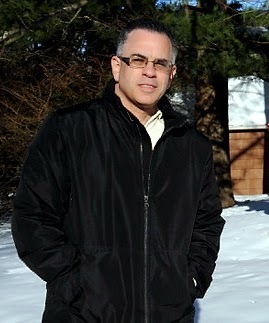
Michael eagerly sought the viewpoints of others. He was schooled by men who grew up with fathers who were part of the founding of the American Mafia. DiLeonardo believed the family elders had wisdom -- and that it was worth the effort to talk to them.
"Junior didn't exercise his learning skills by listening to older men in the family.
"I would tell him all the time -- I know two old timers - one's father was first boss of bosses..."
"He'd say 'Yeah, yeah, yeah..."
During a visit to Arizona, DiLeonardo met John "Johnny Mash" Mascia, who had a house there.
Through Johnny Mash, DiLeonardo met Frank Valenti, who at the time was in video gambling machines.
Valenti (September 14, 1911 - September 20, 2008) was a legendary boss and founder of the Rochester crime family, which he headed from 1964 until 1972. The Pittsburgh crime family had assisted Valenti in forming the borgata, which operated in the Buffalo crime family's turf..
Valenti was one of the last living attendees of the 1957 Apalachin Conference.
"Frankie Valenti starts talking history with me," Michael said.
When he returned to New York, DiLeonardo told John Junior: "We should buy this guy a ticket and have dinner with him. We could learn."
"Yeah, yeah, yeah..."
"He knew too much. Old timers, that's how you learn, talking to the old timers.
"He felt like he knew it all.
"When you die in your bed like Carlo Gambino, that's when you can say you know it all."

Did Junior Quit the Mob?
"This is what I think happened. He went to see his father and watched his father get progressively worse at Marion (frustration over the life sentence, then cancer was the cause of Gotti Senior's change)."
Initially, John Senior wanted to know what was happening in the streets. He told John Junior to send him photographs.
So they started taking photographs.
"Junior said, my father wants us to take pictures. So we'd go to dinner with 15 guys and take pictures.
"Senior wanted to know what was going on. He'd get frustrated because he had no control. For a guy with John's ego - that must be super frustrating."
"The frustration was building up in him during family visits. He'd take it out on his family, including his grandson.
"He had no control and he wanted to keep control -- and how he kept control was through the use of extreme violence and extreme fear."
"Junior was visibly upset seeing how his father had deteriorated. He knew the guy was withering away. You could see it on Junior's face.
"There came a point he said, 'Michael, do me a favor you handle all the captains in Brooklyn. Anybody wants to see me, tell them I'm tied up. I'll have my uncle Pete handle other skippers. I just wanna back up a little bit.'
"I said to myself: what is he doing, a Paul Castellano?
"Junior must have seen the digression in his father. He didn't want to die that death. I think he started to get fearful. I would never have hurt Junior or betray him while we were in the street. He was my compare and my boss. I was with him till our ends."
So Junior pulled away from the crime family.
"He's hanging out with Dr Klein, going to see Riverdance. I don't know what the fuck happened. Dr. Klein would see Junior after midnight at Northshore hospital. Then he started getting pains in his head.
"We both cooperated, John Alite and myself -- he can say we're punks etc. But I could have crushed him. If I wanted to lie, I could have put him in numerous murders, which I did not.
"I did not. I could have and I did not.
"People can't see it or don't want to see it. They wanna champion the Gotti cause when they see him" in the media and on the Internet. "People are enamored with it. But unless you were inside, you can't know what it truly means."
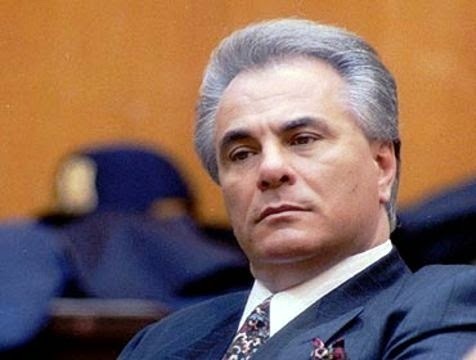
Johnny Alite touched a nerve, Michael said.
"When the 302 came out, there is no way John Junior could spin and get away from it.
In the 302, "he blames two separate murders on two separate guys. And now he says he lied about it. To me, that is less than rat."
"Junior will never convince the street guys that what he did was right -- meaning how he fought his trials and how he tried to explain away the 302. He’s done in the street.
"It's the public -- his fan club.
"He has to keep up the image. He will never ever forgive John Alite -- because of what he, John Junior, did to himself.
"I understand and have already forgiven John Junior," Mikie Scars added.
On that note we include a personal message to the Johns, Junior and Alite, from Michael DiLeonardo...
To John A. Gotti and John Alite:
John Junior, pack up your family and move to South Carolina, North Carolina, Florida -- live up to what you promised during your trials. If you love and care for your family, take them out of that environment.
Because there is no question this is having an impact on them.
You have the women and children in your family fighting this poison with John Alite in the press.
John Junior and John Alite -- you both need to stop it, remember WHO and WHAT you were.
Your family is more important than the "Gotti Legend." That is done, no saving it.
You and John Alite have a long history with each other. You also have children that are involved in this mess. Sooner or later your kids -- both of your kids -- will be going after each other to defend their dads.
Do you want that for your kids? Violence and prison?
Intervene now. You both have a lot of dirt on each other. Leave dirt where it belongs, on the ground. Stop kicking it into each other's faces.
Here is an offering from me -- I will personally mediate a truce between the two of you if you want.
Respectfully,Michael DiLeonardo
We can be contacted on Michael's behalf at eddie2843@gmail.com

Published on May 07, 2015 00:59
May 6, 2015
Pizzeria Owner Ate Rival, Was Ndrangheta's U.S. Cocaine Connection
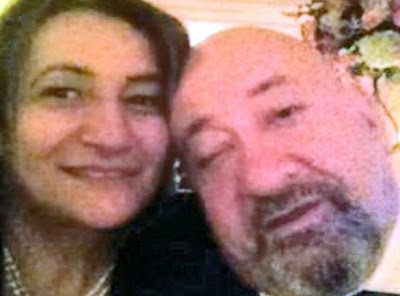 The Gigliottis, husband and wife, was the U.S. connection between the
The Gigliottis, husband and wife, was the U.S. connection between theNdrangheta and South American drug cartels.
A savage mafia mobster arrested in New York for his part in a transcontinental cocaine trafficking network boasted to his wife that he ate the heart and kidney of a rival who owed him money, it is alleged.
Gregorio Gigliotti was the U.S. broker between the Ndrangheta, considered Italy's richest and most brutal organized crime syndicate, and the South American drug cartels. Despite reports to the contrary, it doesn't appear the New York families is implicated in this case.
Longtime Calabria-based anti-Mafia prosecutor Nicola Gratteri said the 'ndrangheta has for some time been beefing up its presence in the United States: "In New York, right under the Brooklyn Bridge."
A pizzeria in Queens run by Gigliotti and his wife was allegedly the centre of a ring that smuggled cocaine in the linings of cardboard boxes containing cassava and tropical fruit.
In a raid in March police seized $100,000, six pistols, a rifle, cocaine and marijuana at the premises.
An additional 15 were arrested in Italy and the U.S. on Thursday for their alleged part in the international trafficking network.
In one phone conversation recorded in a police wiretap Giglotti allegedly told his wife Eleanora Lucia what he had done to someone who had mislaid $20,000.
'You still don't know me, even you? Do you remember one time I told you that at the same table I ate a soffritto…I ate a kidney and a piece of heart.'
In the August 2014 conversation his wife replied: 'You are half crazy. You are making me vomit Greg.'
Prosecutors allege that he was talking about eating a human being, explaining in the arrest warrant: 'He had literally eaten the organs of the person as gesture of blatant contempt to the victim.'
Also see: The Octopus's Tentacles Reach Far and Wide: “The only thing that can’t be bribed is the weather.”
--Southern Italian proverb
The mob operative seemingly modeled himself on the brutal gangsters in the film Casino, the wire taps reveal.
In another phone tap Gigliotti threatened to carry out a violent scene from the Martin Scorsese film in which two characters get beaten with baseball bats and buried alive, prosecutors claim.
'Do you remember the movie Casino?' he asked his son in a recorded conversation. 'Do you remember what happened to the two brothers? This is what I have to do to him.'
The gang member even threatened to murder his own colleagues, according to investigators in Italy.
He allegedly claimed he would make two alleged Ndrangheta members Franco and Pino Fazio who crossed him 'disappear' by 'dissolving them in acid.'
Gigliotti was angry with the brothers, who falsely made him believe that a Ndrangheta colleague had not settled a debt for a consignment of drugs purchased, prosecutors allege.
Recorded by a police wiretap in the car, Gigliotti told his wife 'He and his brother are .. the godfather must give me 35,000.
'But listen, they need to disappear.. and it will be both of them together ..one brother will fall the ground .and the other will not understand what is happening .. and then we will see, they will be dissolved in acid. .. I will show them.. they have no shame, they will have nothing. '
The arrest warrant said: 'These words need no further explanation, revealing a disturbing personality that would push for such serious consequences for a debt of a few thousand euro.' the investigation showed with the brothers his link to the Ndrangheta clans, it is alleged.
This level of brutality is not unusual in the group, based in Calabria, the 'toe' of Italy in the deep south. In 2013 one Ndranghetista admitted feeding a rival alive to pigs in retaliation for the murder of a godfather.
Although the Sicilian mafia Cosa Nostra has found worldwide notoriety as the subject of the Godfather films the Ndrangheta has emerged in recent years as the most ruthless and wealthiest crime syndicate in Italy.
Based on close family ties and blood bonds, its tentacles have spread across the globe through emigration from Italy. It now has established bases in Australia, Spain and the US as well as Canada and Latin America and may have as many as 60,000 members according to a recent study.
The South American link has proved particularly useful - it is also the only one of the three main Italian mafias to do business with the South American cartels even acting as an intermediary for other mafia bosses.
Despite its international network, the roots remain obscure. Informants are rare due to close family ties. The members swear oaths for life in masonic rituals using religious symbolism and codes.
What is known is that the crime syndicate began in the mid nineteenth century as bandits who also developed organized methods of extortion and racketeering.
They later moved into kidnappings on an industrial scale, abducting wealthy businessmen or their children, from northern Italy and holding them for ransom.
The group kidnapped around 600 people between the 1960s and 1990s holding many of them in caves on Aspromonte the craggy and inhospitable mountain that runs through the middle of the region. A cross on the mountain was the ransom drop point. Many of them were held for months in terrible conditions and some were never seen again, even if their relatives did pay.
The most famous was the kidnap of John Paul Getty's teenage grandson. His ear was chopped off after his grandfather refused to pay.
Billionaire former prime minister Silvio Berlusconi was allegedly forced to employ a stable manager from the Sicilian mafia and pay regular bribes as a guarantee against his kidnap by the Ndrangheta.
Later the syndicate moved into the more profitable area of drugs and are now thought to control some 80 per cent of Europe's cocaine imports.
In 2006, Italy's then interior minister blamed the assassination of a Calabrian politician on the local Ndrangheta, which he said was 'the most deep-rooted, the most powerful and the most aggressive of [Italy's] criminal organisations'.
They have also been shown to be ruthless, and insensitive even to some of the code of conduct other mafias broadly follow, such as not killing children or attacking priests.
Last year three-year-old Coco Campolongo was murdered by the Ndrangheta because his gangster grandfather was considering turning state witness.
The group go to extreme lengths to stop the police and judicial authorities from acting against them. In 2010 they planted a Yugoslavian bazooka near a courthouse in southern Italy as act of intimidation following a crack down and hundreds of arrests.

Published on May 06, 2015 12:13
May 4, 2015
"Mikie Scars" Speaks....
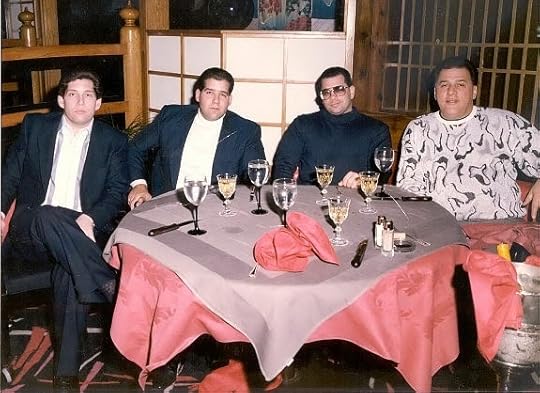 Michael DiLeonardo, far left.
Michael DiLeonardo, far left.TWO-PART TREVOR McDONALD ITV SHOW INCLUDED
We finished part one (yes, we whacked it in half because the story is long and we don't want to cut a single thing) and are having it edited letting it cool off before a final edit.
Some of you hate these previews, and have clearly expressed this in comments. But please indulge us as these things do serve a purpose... Also: we found The Mafia with Trevor McDonald show in which DiLeonardo and other mobsters and associates appeared.
"Mikie Scars" chatted with us last week for quite a while. As a result you'll learn things you never knew or imagined about the Gambino crime family during the Gotti reign. ( Such as Michael actually spells his name "Mikie".... )
Michael "Mikie Scars" DiLeonardo was a Gambino capo, close to Junior Gotti since before they were inducted in a Christmas Eve 1988 ceremony. The relationship carried on for decades until DiLeonardo was arrested four days after John Gotti Senior's burial. (The FBI caught on film DiLeonardo attending Gotti's wake.
He flipped months later.Except for his turn on Trevor McDonald's ITV two-part Mafia documentary, He has never spoken publicly outside of testifying, to our knowledge.
Well, he talked to Costa Nostra News and you'll want to read what he said.
ALSO SEE: Cosa Nostra News: "Mikie Scars" Testimony

Published on May 04, 2015 01:23
May 2, 2015
Real Mob Wife Fires Away at "Mob Wives"
 The "old" cast is new... almost.
The "old" cast is new... almost.
Our source is a beautiful woman, classy -- one tough cookie. She also knows a lot about VH1's Mob Wives cast members--we refer to the "classic" cast. What annoys this lady (who some would consider Cosa Nostra royalty) is the fact that she believes the stars of Mob Wives are serving as role models for young women. Keep this in mind.
"First off, understand: They are not Mob Wives. None of them."
"They are all liars and everyone on Staten Island has no respect for them. And how they chased her father because of the show!
Our source had spoken with show producers about appearing, but decided not to.
She realized that they wanted her to provoke a feud with one of the other women.
"I realized I would have to beat her brains in on national TV and I and my family said I've always carried myself with class and dignity. I don't act like that.
"No Italian guy will go near them! They are slobs who have been locked up, who are on drugs and who sleep with married men for years.
"They sell their souls for cash! I was brought up in a different environment. The men in my family were real classy and real old time.
"I don't play their game, they were girls I knew but were never my friends, or even acquaintances, if you will."
 The sexy Love....
The sexy Love....Remember the hubbub about Love? "Carla was suing them, Renee, Love and Jen, she and went crying to VH1. Now she's going to be back on the show. Frauds all of them
"Renee lied about going to rehab. She never went. Liar.
"They fired Love for beating up Carla but that's why they hired her ... then Jen and her partner were supposedly robbing money from Vh1 and they threw Love under the bus because the rat Carla was gonna sue them.
"And Renee's father from the streets is no longer involved, they threw him to the dogs because he allows his daughters to do the show.
"So these are the women young girls should look up to.
"Karen arrested for drugs, Jennifer arrested for drugs, Renee is on junk and slept with married men. Ang who I like but was a coke head slept with married men her whole life for money and apartments and jewelry and furs. Carla is a slob who slept with ex-husbands for years.
"Drita I don't know.
"So my point here is, enough with idolizing trash. Oh and none are mob wives! Ok I'm done."

Published on May 02, 2015 14:47



